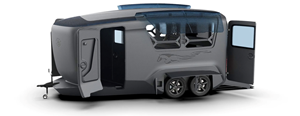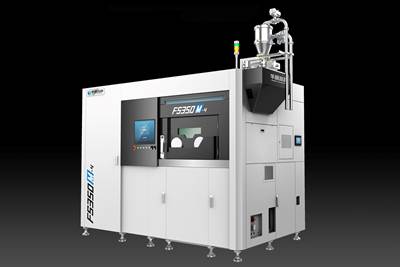Hexagon Invests in Divergent’s Autonomous, Sustainable Manufacturing
The Divergent Adaptive Production System (DAPS) is a fully integrated software and hardware solution, creating a complete modular digital factory that combines AI-optimized generative design software, additive manufacturing and automated assembly to build lightweight automotive parts and frames.
Hexagon — a global provider of digital reality solutions combining sensor, software and autonomous technologies — is investing $100 million in Divergent Technologies Inc., a provider of green manufacturing technologies with a modular digital factory for the automotive industry.
Divergent has developed an alternative production process to traditional vehicle manufacturing called DAPS (Divergent Adaptive Production System) that addresses economic and environmental challenges head-on. DAPS is a fully integrated software and hardware solution, creating a complete modular digital factory for complex structures. The process combines AI-optimized generative design software, additive manufacturing (AM) and automated assembly to build lightweight automotive parts and frames.
The design software optimizes the weight, strength and cost of vehicle models. Parts are 3D printed and assembled autonomously, reducing manufacturing time and human intervention. Regardless of the design, part manufacturing and assembly can be carried out using the same hardware infrastructure, enabling quick design iterations or seamless switches between different vehicle models without downtime.
It is said the design-agnostic process is less energy- and resource-intensive, delivers more efficient structures faster, and achieves weight reductions between 20% and 70%, leading to dramatic improvements in vehicle efficiency.
“Manufacturing a car’s parts has a much greater impact on the environment than the car’s exhaust emissions, which is why new manufacturing concepts will win,” says Hexagon President and CEO Ola Rollén. “We must find ways to empower carmakers with more efficient and environmentally friendly manufacturing processes that minimize material usage and total system cost. Incremental steps are simply not enough to save the planet.”
In his keynote speech at HxGN LIVE Global 2022, Rollén I delivered a message of hope for a sustainable future. “While the steep climb in emissions over the last 30 years happened on our watch, none of us want to go down in history as the CO2 Generation — the one that polluted and warmed this planet,” Rollén says. “For that reason, Hexagon continues to invest in disruptive and unconventional technologies that make giant leaps forward. We are the perfect partner to ensure quality is delivered throughout this new, innovative manufacturing process. Together, Hexagon and Divergent will deliver the smart manufacturing concepts of the 21st Century.”
Divergent Technologies is pleased with the partnership. “We are humbled and honored to be partnering with Hexagon,” says Kevin Czinger, Divergent’s founder and CEO. “Having their vote of confidence in what we’ve built and our vision for the future of manufacturing brings new energy and enthusiasm to our team.”
The investment will enable Divergent to accelerate its plans to build a global network of DAPS factories, each serving multiple OEM clients. “We look forward to a long-term relationship with Hexagon as Divergent and Czinger Vehicles scale,” says Lukas Czinger, Divergent’s SVP of Operations and Czinger Vehicles Co-Founder.
Founded in 2014 and headquartered in Torrance, California, Divergent says it transforms car manufacturers into agile, design-driven organizations free from capex constraints. A tier-one supplier, its end-to-end solution is widely applicable to any structure-based, discrete manufacturing process and has already proven to meet the most demanding automotive and aerospace applications. It is said Divergent’s digital, modular, flexible and automated production solution produces significantly fewer life cycle emissions than traditional manufacturing.
- Read about Divergent Technologies’ work on high-volume, optimized automotive production through additive manufacturing with the company basing its vehicles on 3D printed structures.
- Learn how General Atomics Aeronautical Systems (GA-ASI) is working to apply Divergent’s data-driven approach to design, fabricate and assemble vehicle structures for manufacturing its line of unmanned aircraft systems.
Related Content
Next-Gen Horse Trailers to Be Built With Robotic 3D Printing
Double D Trailers is currently developing a prototype horse trailer that will be made with large-format additive manufacturing. The technology brings potential benefits for labor, weight and design features to this subset of recreational vehicles.
Read MoreVideo: A Mechanical Method for Metal Powder Production
Metal Powder Works has developed a method for producing powders from solid barstock, no melting required. This video covers how the process works and benefits of mechanical production of powders.
Read MoreHow 3D Printing Aids Sustainability for Semiconductor Equipment: The Cool Parts Show Bonus
Hittech worked with its customer to replace fully machined semiconductor trays with trays made via DED by Norsk Titanium. The result is dramatic savings in tool consumption and material waste.
Read MoreCopper, New Metal Printing Processes, Upgrades Based on Software and More from Formnext 2023: AM Radio #46
Formnext 2023 showed that additive manufacturing may be maturing, but it is certainly not stagnant. In this episode, we dive into observations around technology enhancements, new processes and materials, robots, sustainability and more trends from the show.
Read MoreRead Next
Bike Manufacturer Uses Additive Manufacturing to Create Lighter, More Complex, Customized Parts
Titanium bike frame manufacturer Hanglun Technology mixes precision casting with 3D printing to create bikes that offer increased speed and reduced turbulence during long-distance rides, offering a smoother, faster and more efficient cycling experience.
Read MoreCrushable Lattices: The Lightweight Structures That Will Protect an Interplanetary Payload
NASA uses laser powder bed fusion plus chemical etching to create the lattice forms engineered to keep Mars rocks safe during a crash landing on Earth.
Read More3D Printed Polymer EOAT Increases Safety of Cobots
Contract manufacturer Anubis 3D applies polymer 3D printing processes to manufacture cobot tooling that is lightweight, smooth and safer for human interaction.
Read More





















